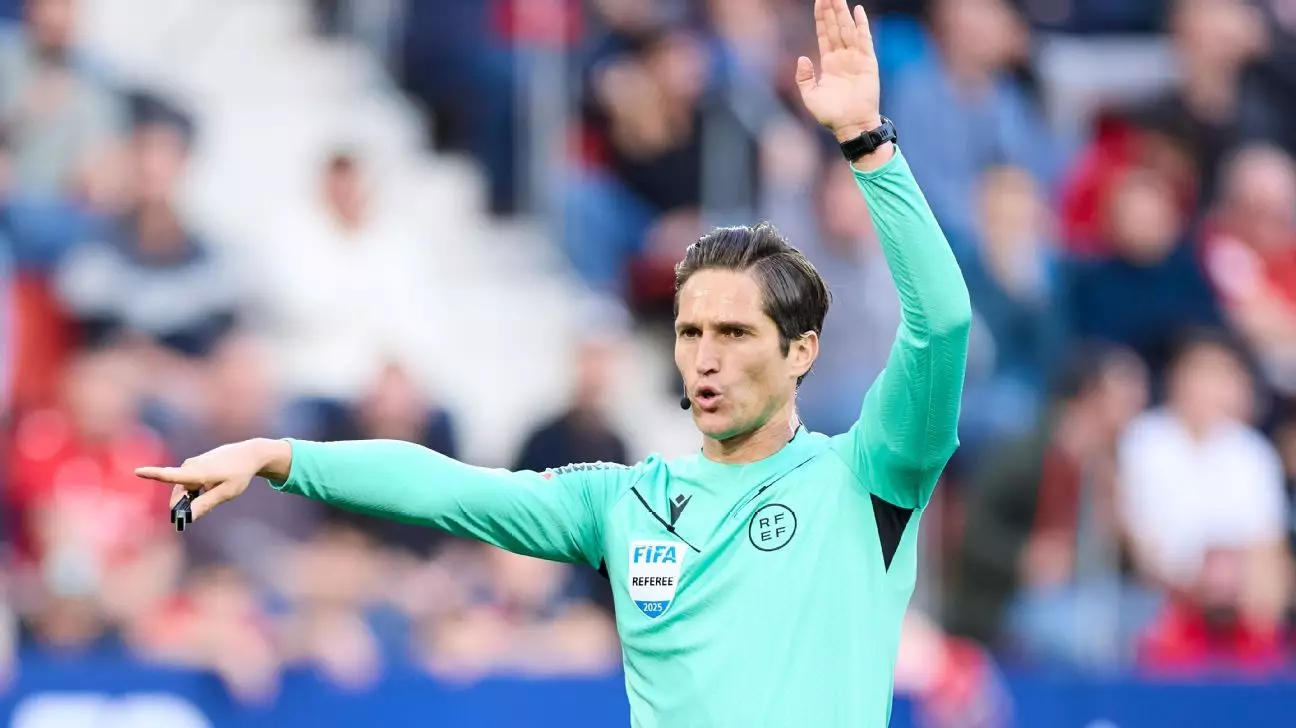The realm of professional sports, particularly football, is often embroiled in controversies surrounding officiating and governance. Recently, the focus has shifted to Spanish football’s referee José Luis Munuera Montero after a red card decision involving Real Madrid’s Jude Bellingham sparked outrage and scrutiny. This incident highlights broader issues regarding transparency, accountability, and the increasing tension between clubs and referees, especially in the competitive atmosphere of LaLiga.
In a heated match held between Real Madrid and Osasuna, an incident occurred that would reverberate far beyond the pitch. Bellingham’s dismissal for a supposed foul led to a 1-1 stalemate, but what captured the media’s attention were emerging allegations regarding Munuera’s potential conflicts of interest. Reports suggested that he was linked to a firm called Talentus Sports Speakers, which purportedly holds affiliations with numerous football entities, including LaLiga and the RFEF (Royal Spanish Football Federation).
The narrative began to unfurl as Real Madrid officials expressed dissatisfaction not just with the decision to send off Bellingham but also about the perceived quality of officiating in Spanish football. The feeling of injustice among Real Madrid supporters further amplified the scrutiny on Munuera, raising concerns about fairness and impartiality in the sport.
In light of the mounting pressure, the RFEF announced it would “begin an analysis” of the allegations against Munuera. This proactive step reflects a commitment to maintaining the integrity of officiating within the league. While this initiative signaled acknowledgment of the issue, it also raised the question: how effectively can the federation separate the officiating process from potential conflicts of interest?
Munuera, in his defense via social media, vehemently denied any wrongdoing. He asserted that Talentus Sports Speakers had not conducted any transactions with sports entities and condemned what he called a disproportionate attack on referees. His vehement declaration also implied that he would pursue legal recourse against those responsible for disseminating what he termed false information. This battle between a referee’s personal reputation and the public’s perception adds layers of complexity to the situation.
The fallout from this incident speaks volumes about the ongoing dialogue regarding the standard and credibility of refereeing. Real Madrid’s actions, including their formal complaint and meeting with RFEF leaders, illuminate a deeper frustration within the club regarding officiating standards. Their continued criticism elevates the conversation about how refereeing is perceived in LaLiga, prompting questions about accountability among officials.
Moreover, the involvement of Atlético Madrid in this discourse cannot be overlooked. Amidst the uproar, Atlético Madrid expressed solidarity with referees, indicating a resistance to what they perceive as undue pressure from powerful clubs. Their statement denotes a desire for unity among clubs and referees, emphasizing that the critical machinery of Spanish football should not succumb to whims of selective criticism.
As issues of transparency and accountability in officiating take center stage, there exists a need for concrete reforms within Spanish football governance. To tackle these prevailing concerns, the RFEF must undertake an in-depth investigation into proposed conflicts of interest while also improving communication between referees and clubs. Clearer guidelines, better oversight, and additional training for officials may help remedy the tensions currently plaguing LaLiga.
Furthermore, media responsibility comes to the forefront. In an age where misinformation can spread like wildfire, it is imperative that sports journalism remains factual and fair. The line between reporting and sensationalism can often blur, leading to damage that extends beyond sports figures to the overall trust in the league’s integrity.
The incident involving José Luis Munuera Montero, Jude Bellingham, and Real Madrid highlights a pivotal moment for LaLiga. As stakeholders ponder the implications of conflict-ridden officiating, the future trajectory of the Spanish football federation must be rooted in transparency, cooperation, and trust. Only through acknowledgment and reform can the league hope to achieve a balance necessary for all to thrive—players, referees, and clubs alike. The saga is an ongoing reminder that the essence of sport not only lies on the field but also in the integrity and fairness that govern it.

